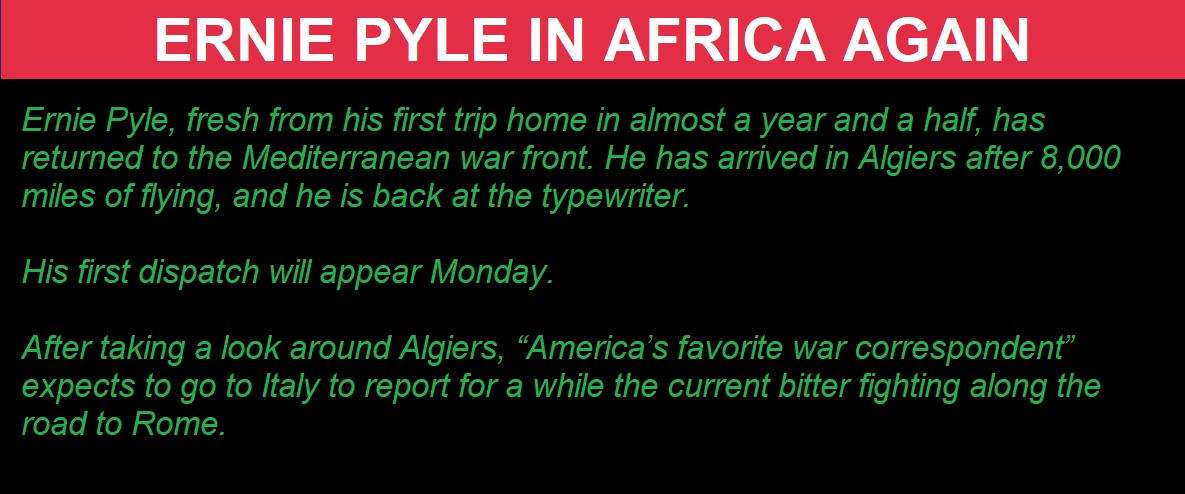The Pittsburgh Press (November 17, 1943)

Roving Reporter
By Ernie Pyle
Ernie Pyle is writing a short series of columns on his experiences and impressions at home while taking a rest from his arduous assignment in the war zones. He is about to shove off again for the battlefronts.
Albuquerque, New Mexico –
You don’t seem to feel the war so very much here in Albuquerque. There are plenty of reasons you should feel it; but I think maybe the bigness of the West, and the stoicism of the Indians, and the magnificence of the sky – somehow, it’s all so big it can sort of absorb tragedy, and tears, and sorrow.
Few communities have been harder hit by the war than Albuquerque. I mean really hit – in the heart. Nearly 400 Albuquerque boys vanished on Bataan. More than 1,300 from throughout this sparsely-populated state were lost with the Philippines.
News of the Albuquerque boys is scarce. Official death notices have been received on 113 of them. More than 300 are still listed as “missing.” Unquestionably many of the remainder are dead by now, from disease and starvation in the Jap prison camps.
The parents of these 1,300 boys feel that they were martyred but it’s too late to do anything about that now, so they don’t make an issue of it.
Form society to aid captives
Instead, they have formed an association, to do what they can – which isn’t much. It is called the Bataan Relief Organization. Their sole purpose is to try to get little relief shipments to their suffering children in the Jap camps.
It would, of course, please the families of this suffering group if our High Command were to direct the mass of American might immediately at the Philippines and at Japan’s heart. It is only human nature that they should feel that way.
Yet they realize the war is broader and greater than their own grief, so they do not attempt to lobby the War Department in any way. They do send an occasional delegate to Washington, but it’s to arrange for relief shipments to their boys, and nothing else.
The Spanish-American people of one community alone recently collected $38 in pennies, nickels and dimes to help send the organization’s president, Dr. V. H. Spensley, to Washington.
Around three-fourths of the 1,300 lost men are of Spanish or Indian blood. Many families have two sons gone with Bataan. The man who laid the brickwork for our house is among them. So is the boy called “Lightning” who used to deliver our groceries. Everywhere you go, you notice the inroads Bataan made upon Albuquerque.
The biggest shipment sent to the boys so far went on the Gripsholm in September. The first shipment of relief packages, sent more than a year ago, reached the prison camps in January, and unquestionably saved many lives.
The last shipment on the Gripsholm cost $27 a box. The contents were meticulously chosen. From $8 to $12 worth of every package was made up of vitamin and salt tablets. Each box also included 250 malted-milk tablets.
In addition to that went candy, antiseptic pencils, underwear, socks, sweaters, shoestrings, chewing gum and razors (they bought up every razor in Albuquerque). Everything that came in glass or tin cans was repacked. The state police helped pick up the packages from all over the state. At the last minute, some packages were specially flown to New York by TWA to catch the Gripsholm.
War bond goal doubled
The Relief Organization holds meetings, gives dances, and is very active. In January, it fostered a statewide “MacArthur Day.” It conducted a one-week war bond and stamp drive, with a quota of $300,000, and raised over $600,000.
The government gave it the right to name a Flying Fortress, so in July the Spirit of Bataan was christened at the Albuquerque Air Base.
The Bataan Relief Organization lists as its purpose:
To obtain immediate relief for all American soldiers held as Japanese prisoners of war, their release as quickly as possible, and their safe delivery home.
And as one of the officers adds:
…trying desperately to keep the heroic deeds of these almost forgotten heroes kindled in the hearts of their countrymen.
My old set in Albuquerque has ceased to exist. It wasn’t a set of young bucks either, but of mature, some of them middle-aged, men. The fun we used to have playing croquet, bowling, shooting at tin cans, and sometimes just going downtown and raising Cain – it will all have to wait for years now before it can ever be resumed. For there’s nobody around anymore.
Earl Mount, the big-hearted, hard-bitten contractor, is in the Aleutians; Arthur McCollum, always sad because he never got overseas in the last war, has made it in this one; Barney Livingstone, the newspaperman, is serving the Navy in Washington; Doc Connor has been freed from delivering babies and has gone into the Navy. There were five of us – and all five of us are gone. But when we all get back – Albuquerque, look out!

